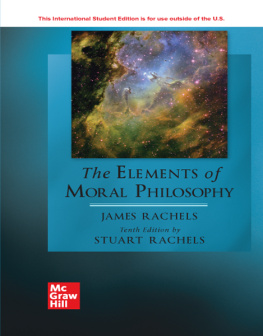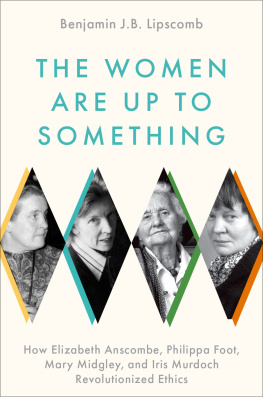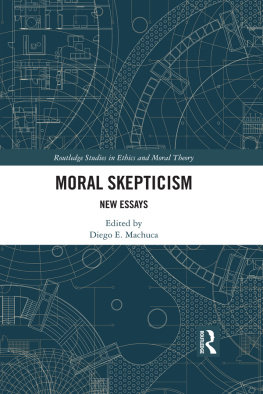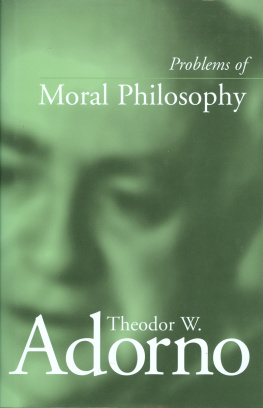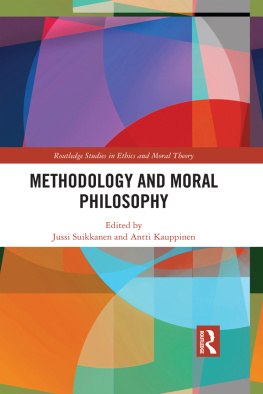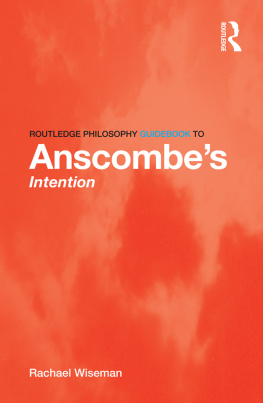Luke Gormally - The Moral Philosophy of Elizabeth Anscombe
Here you can read online Luke Gormally - The Moral Philosophy of Elizabeth Anscombe full text of the book (entire story) in english for free. Download pdf and epub, get meaning, cover and reviews about this ebook. year: 2016, publisher: Imprint Academic, genre: Science. Description of the work, (preface) as well as reviews are available. Best literature library LitArk.com created for fans of good reading and offers a wide selection of genres:
Romance novel
Science fiction
Adventure
Detective
Science
History
Home and family
Prose
Art
Politics
Computer
Non-fiction
Religion
Business
Children
Humor
Choose a favorite category and find really read worthwhile books. Enjoy immersion in the world of imagination, feel the emotions of the characters or learn something new for yourself, make an fascinating discovery.

- Book:The Moral Philosophy of Elizabeth Anscombe
- Author:
- Publisher:Imprint Academic
- Genre:
- Year:2016
- Rating:3 / 5
- Favourites:Add to favourites
- Your mark:
- 60
- 1
- 2
- 3
- 4
- 5
The Moral Philosophy of Elizabeth Anscombe: summary, description and annotation
We offer to read an annotation, description, summary or preface (depends on what the author of the book "The Moral Philosophy of Elizabeth Anscombe" wrote himself). If you haven't found the necessary information about the book — write in the comments, we will try to find it.
The Moral Philosophy of Elizabeth Anscombe — read online for free the complete book (whole text) full work
Below is the text of the book, divided by pages. System saving the place of the last page read, allows you to conveniently read the book "The Moral Philosophy of Elizabeth Anscombe" online for free, without having to search again every time where you left off. Put a bookmark, and you can go to the page where you finished reading at any time.
Font size:
Interval:
Bookmark:
Title Page
The Moral Philosophy of Elizabeth Anscombe
Edited by
Luke Gormally, David Albert Jones and Roger Teichmann
Publisher Information
Published in 2016 by
Imprint Academic
PO Box 200, Exeter
EX5 5YX, UK
imprint-academic.com
Digital edition converted and distributed by
Andrews UK Limited
www.andrewsuk.com
Copyright 2016 Luke Gormally, David Albert Jones and Roger Teichmann
Individual contributions 2016 the respective authors
The moral rights of the authors have been asserted. No part of this publication may be reproduced in any form without permission, except for the quotation of brief passages in criticism and discussion.
Cover Photograph: St Salvators Quadrangle, St Andrews by Peter Adamson from the University of St Andrews collection
Other Books in this Series
ST ANDREWS STUDIES IN PHILOSOPHY AND PUBLIC AFFAIRS
Founding and General Editor:
John Haldane, University of St Andrews
Values, Education and the Human World
edited by John Haldane
Philosophy and its Public Role
edited by William Aiken and John Haldane
Relativism and the Foundations of Liberalism
by Graham Long
Human Life, Action and Ethics: Essays by G.E.M. Anscombe
edited by Mary Geach and Luke Gormally
The Institution of Intellectual Values: Realism and Idealism in Higher Education
by Gordon Graham
Life, Liberty and the Pursuit of Utility
by Anthony Kenny and Charles Kenny
Distributing Healthcare: Principles, Practices and Politics
edited by Niall Maclean
Liberalism, Education and Schooling: Essays by T.M. Mclaughlin
edited by David Carr, Mark Halstead and Richard Pring
The Landscape of Humanity: Art, Culture & Society
by Anthony OHear
Faith in a Hard Ground: Essays on Religion, Philosophy and Ethics by G.E.M. Anscombe
edited by Mary Geach and Luke Gormally
Subjectivity and Being Somebody
by Grant Gillett
Understanding Faith: Religious Belief and Its Place in Society
by Stephen R.L. Clark
Profit, Prudence and Virtue: Essays in Ethics, Business & Management
edited by Samuel Gregg and James Stoner
Practical Philosophy: Ethics, Society and Culture
by John Haldane
Sensibility and Sense: Aesthetic Transformation of the World
by Arnold Berleant
Understanding Teaching and Learning: Classic Texts on Education
edited by T. Brian Mooney and Mark Nowacki
Truth and Faith in Ethics
edited by Hayden Ramsay
From Plato to Wittgenstein: Essays by G.E.M. Anscombe
edited by Mary Geach and Luke Gormally
Natural Law, Economics, and the Common Good: Perspectives from Natural Law
edited by Samual Gregg and Harold James
The Philosophy of Punishment
by Anthony Ellis
Social Radicalism and Liberal Education
by Lindsay Paterson
Logic, Truth and Meaning: Writings by G.E.M. Anscombe
edited by Mary Geach and Luke Gormally
The Moral Philosophy of Elizabeth Anscombe
edited by Luke Gormally, David Albert Jones and Roger Teichmann
Preface
John Haldane
Elizabeth Anscombes article Modern Moral Philosophy, published in 1958, is in some respects a characteristic piece of work. It approaches its topic afresh, argues from first to last, introduces many striking ideas (some as asides), but is more concerned to identify fallacies and confusions and refute prevailing dogmas than it is to set out a theory of its own. It is unlike much of her work, however, in having a broadly narrative structure, and offering something of a historical survey. These two features may be attributable to the circumstances that led to its being composed: reading in short order a great many writings in moral philosophy for the purpose of tutoring in the subject, and undertaking to give a non-specialist talk on the theme of the title.
Like much of Anscombes work its freshness endures; but it also seems to have something of a prophetic character. The latter impression is due in large part to the fact that it gave rise to future developments in British, and later American, moral philosophy, so that looking back at it later it appeared to anticipate them. The main developments came in two phases: first, stalling and then reversing the trend to assume that there is no intrinsic connection between facts, values and practical directives; second, directing attention towards the category of virtues in attempting to say how one ought to act. Although the second is now the more prominent association, it is the first that she was herself more concerned with.
If Anscombe had written nothing else on ethics she would still have been known for Modern Moral Philosophy; and indeed many who know of it may have read little else by her on moral themes. Such is the unsystematic character of her writings that it is not obvious at first or second pass what the connections may be between her investigations of intention, promising, authority, killing and other topics. There is also the fact that much of what she wrote on first-order topics, or ethical questions, appeared in publications that would not easily come to the attention of academic philosophers; and remained uncollected in her lifetime.
Ten years ago St Andrews Studies in Philosophy and Public Affairs published Human Life, Action and Ethics: Essays by G.E.M. Anscombe edited by Mary Geach and Luke Gormally. A decade later three further volumes of Anscombes writings have appeared in the same series. I am very grateful to those editors for their work in making this body of material available. It includes a few essays previously included in earlier collected papers but which are now set in contexts of other hitherto inaccessible or unpublished associated writings thereby allowing readers to get a broader, deeper and more detailed sense of Anscombes thought.
Given this background it is very fitting that the volume immediately succeeding the last of Anscombes own writings should be a collection of essays exploring aspects of her moral philosophy. Here we see reflections on themes presented in the 1958 essay, but also on topics from earlier and mostly from later writings. As we proceed towards the centenary of her birth in 1919, thanks to Geach and Gormally and to the editors of the present volume and the authors they have collected, we are in a better position than ever before to understand Elizabeth Anscombes philosophy and to evaluate it.
As General Editor of the series I am grateful to all concerned, including Jared Brandt and Graham Horswell who were involved in aspects of the production.
Contributors
John Finnis is Biolchini Family Professor of Law, University of Notre Dame, and Emeritus Professor of Law and Legal Philosophy, Oxford University.
Kevin L. Flannery SJ is Professor of Ancient Philosophy, Gregorian University, Rome.
Mary Geach is the literary executor of Elizabeth Anscombe, co-editor of four volumes of her papers, and an independent scholar.
David Goodill OP is a lecturer in moral theology, Blackfriars, Oxford.
Luke Gormally is Director Emeritus of The Linacre Centre for Healthcare Ethics and co-editor of four volumes of Elizabeth Anscombes papers.
Edward Harcourt is a University Lecturer (CUF) and Official Fellow and Tutor in Philosophy, Keble College, Oxford.
David Albert Jones is the Director of the Anscombe Bioethics Centre, Research Fellow at Blackfriars Hall, Oxford, and Visiting Professor at St Marys University, Twickenham.
Anselm Winfried Mller is Chicago Moral Philosophy Seminar Visiting Professor, University of Chicago, and Emeritus Professor of Philosophy, University of Trier.
Matthew B. OBrien works in finance and formerly was a lecturer in philosophy at Rutgers University and a post-doctoral fellow at Villanova University.
Next pageFont size:
Interval:
Bookmark:
Similar books «The Moral Philosophy of Elizabeth Anscombe»
Look at similar books to The Moral Philosophy of Elizabeth Anscombe. We have selected literature similar in name and meaning in the hope of providing readers with more options to find new, interesting, not yet read works.
Discussion, reviews of the book The Moral Philosophy of Elizabeth Anscombe and just readers' own opinions. Leave your comments, write what you think about the work, its meaning or the main characters. Specify what exactly you liked and what you didn't like, and why you think so.

